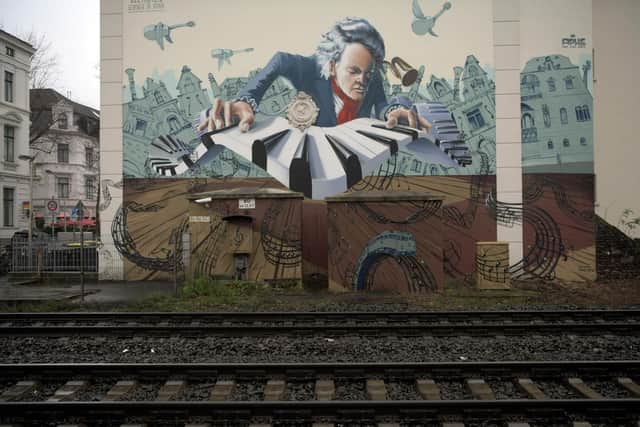Book review: Beethoven’s Assassins, by Andrew Crumey
It’s Shakespeare, in the first act of Hamlet, who forever reminds us that there are more things in heaven and earth than are dreamt of in our philosophy; and Andrew Crumey’s latest novel takes the form of a vivid 500 page variation on that theme, inspired by the power, depth and beauty of the music of Beethoven.
For all our attempts at analysis or interpretation, after all, the precise nature of that power remains mysterious to us; and the many voices that we hear in Crumey’s novel – from the brisk introductory chapter in the voice of Beethoven’s much-despised sister-in-law Therese, to the central story of a present-day academic called Robert Coyle, who is pondering a book on Beethoven and philosophy – seem to circle around the life and work of the great man with varying degrees of predatory intent, and in an ever more complex dance of truth and contradiction, speculation and uncertainty.
Advertisement
Hide AdThe action centres, loosely, on a country house in the Scottish Borders that was once the 19th century home of an eccentric former military man, then a psychiatric hospital with mystical interests run by an enigmatic Dr Hyle, then a centre of military operations and research during and after the Second World War, and now an institute or retreat where experts from a wide range of disciplines – art and science, academia and industry – are invited to meet and share their wisdom.


From the 1820s to the 1920s and the 2020s, the house – and particularly its windowless upstairs library – seem linked to Beethoven’s life and music through a strange web of connections, involving mystical traditions from that range from freemasonry and the Maltese Knights of St John, to the booming interest in various forms of mystical knowledge and conspiracy in Beethoven’s Vienna, and the early 20th century supernatural experiments of Aleister Crowley and George Gurdjieff. There are speculations about past life regression, forms of telepathy linked to musical frequencies, and the impact of the theory of relativity, and later of quantum physics, on our linear understanding of time; and there are sudden deaths, which often seem to strike people on the point of discovering, or perhaps revealing, the truth behind some of these speculations.
The overall effect is like a brilliantly well-informed 200-year history of philosophy, science, music and mysticism, touched with an edge of Da Vinci Code hocus pocus, in the sense of an alternative “sub rosa” world history never quite revealed. To say so, though, is to miss the sheer fun and narrative energy of Crumey’s writing, the skill and insight with which he conjures up each of his narrators from the repellent to the poignant, and the huge ingenuity with which he interweaves their stories, including that of Adam Crouch, a failed writer and memorably seedy 21st century buffoon, who enters the story by accident, and becomes its final boozed-up witness to timeless tragedy.
There’s something profoundly post-modern about the dense cultural references, and the complex patchwork of fact and fiction, that make up Crumey’s narrative; and in that sense it continues in a vein he has been mining for the last 25 years and more. The intensity with which the story questions the very nature of time, though – and follows its central voice, Robert Coyle, through the strange reality-shifting nightmare of the pandemic – seems entirely of this moment; as if Crumey were leading us into a terminal vortex of history and thought, music and culture, parallel universes and competing realities, where all things sparkle and implode with extraordinary vividness, on the edge of oblivion.
Beethoven’s Assassins, by Andrew Crumey, Dedalus, 512pp, £12.99